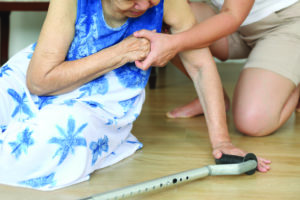 Do you ever feel faint or lose your balance? Are your legs unsteady or seem like they’ll give way? Would you feel safer using a walker or cane?
Do you ever feel faint or lose your balance? Are your legs unsteady or seem like they’ll give way? Would you feel safer using a walker or cane?
If you answered yes to any of these questions, talk to your doctor about preventing falls that can lead to serious injury. Meanwhile, consider these other ways you can help fall-proof your life.
■ Get rid of clutter. It’s a good idea to remove cords, crowded furniture, slippery rugs and anything you can trip over at home. Good lighting is essential. Consider night lights for your bedroom, hallways and bathroom.
■ Wear it wisely. Replace slippery shoes with non-skid, safer alternatives. Avoid wearing long clothing, such as mu‘umu‘u or robes, and blankets that could get caught under your feet.
■ Adjust your glasses. If your glasses (bifocals, transition lenses) make it difficult to perceive changes in elevation, such as stairs, curbs and driveways, make an eye doctor appointment.
■ Check your medications. Some medications may cause side effects that can lead to a fall. It’s important to regularly review your medications with your doctor. (Be sure to include all over-the-counter medicines, supplements and herbal medications you take.)
■ Plan ahead. If possible, sign up for a medical alert system, or keep a portable or mobile phone nearby. Voice-activated devices such as smart watches and virtual assistants (Amazon Echo, Google Home) can also be used to call for help in a fall emergency. It’s a good idea to give a spare key to a family member or a friend, and to program their phone numbers in your phone.
■ If you fall and can’t get up… If you need help, try to make noise, shout, bang on something, call 911 or press your medical alert button. Move your legs, arms and lift your hips slightly to help prevent pressure sores from starting.
■ Improve balance with leg bends. Bend one knee so your foot comes up behind you and is level with your knee. Lower your foot to the floor. Repeat with the other leg. Hold on to a sturdy chair or wall. Be sure to talk to your doctor before doing this or any other exercise program.
■ Add strength to your core. Sit in a sturdy chair placed against a wall. Stand up without using your hands. If this is too hard, start by using a pillow on the chair until you get stronger. Repeat 10 to 15 times, if possible. Again, talk to your doctor before doing this or any other exercise program.
KAISER FOUNDATION HEALTH PLAN, INC.
711 Kapiolani Blvd., Honolulu, HI 96813
808-432-5915 (TTY 711) | www.kp.org
This article contains health and wellness or prevention information.


Leave a Reply